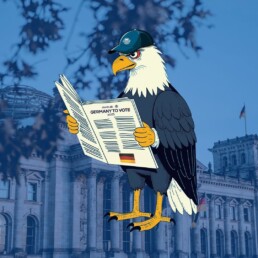Germany to vote: Here's why it matters to you!
🇩🇰 Du finder den danske version af denne artikel her.
Conversation with Mads Jedzini, Analyst at the European Think Tank
This coming weekend, Germans will vote to elect a new Bundestag, a new government, and a new chancellor. Germany is politically divided, and the right-wing is surging.
Polls, however, indicate that Friedrich Merz from CDU is set to take over the chancellor position, but he will have to form a coalition with either Olaf Scholz (SPD) or Robert Habeck from the Greens. Or perhaps both?

The election reveals a clear divide in the country. In the east, the right-wing party Alternative für Deutschland (AfD) is strong, while the conservative parties dominate in the west. At the same time, the economic differences remain significant, with incomes generally lower in the former East Germany.
The election comes at a crucial time, with Donald Trump making a comeback in the White House, and Europe facing major decisions about defense and competitiveness.
And how do the Germans themselves view the situation? We spoke with Mads Jedzini, analyst at the European Think Tank, to get answers. He is an expert in German politics and EU relations, winner of the Danish Germanist Association’s Thesis Award, and has experience from both the Ministry of Foreign Affairs and the Danish Embassy in Berlin.
Mads, why is the German election important for Denmark?
“Firstly, Germany is one of Denmark’s most important trade partners. How things go in Germany has a direct impact on Denmark. We’ve seen this just this week, as tough economic times in Germany have led to job losses in Denmark. There are thousands of Danish jobs directly linked to the German market.
Secondly, Germany is one of Denmark’s most important political allies. Many look towards the United States, but that cooperation has its challenges, as we’ve seen recently. Germany and Denmark have traditionally shared common interests, particularly in green transition, fiscal policy, and free trade. Both countries have been leaders on the green agenda, both have historically been part of the “austerity club” in the EU, and both have been oriented towards free trade and market economies. So, what happens in Germany has a direct impact on Denmark, because it influences how we can position ourselves in the EU.”
Many are hoping for a bit of a 'back to the future' effect

Mads Jedzini
How do Germans view this election?
“The election is associated with a great deal of drama. There is a widespread feeling that something needs to change because the economy is doing poorly. That’s the headline.
At the same time, we see a far-right party making significant gains in the polls, leading to massive demonstrations with tens of thousands of people. There is real fear among many citizens—not just for their jobs, but also for the system they will wake up to after the election.
There has been speculation about Elon Musk’s involvement in the debate, but it hasn’t had any measurable effect in the polls. It was certainly discussed, but it’s highly exaggerated to say it had any impact.
Overall, this is an election marked by pessimism and a diminished belief in the future. Many are hoping for a bit of a ‘back to the future’ effect—a return to the happy 90s, when things seemed more predictable.”
How does German politics differ from Danish?
“Germany has always been far more focused on stability than Denmark. While we have a tradition of broad compromises and minority governments, Germany has had a different political culture. There, you see majority governments with all that comes with it. The current government fell precisely because they had to form a broad coalition that united quite differing interests—and there is no indication that this will become easier in the future.”
Everything points to a government led by Friedrich Merz
Could the election change the balance of power in Europe?
“It definitely could. If things go as we expect, we will have a conservative chancellor in Germany, a conservative German president of the European Commission, and a conservative German leader of the largest political group in the European Parliament. Additionally, there will be a general shift to the right in the EU. So, we’re looking at a more conservative Europe in the coming years.
In terms of politics, we can expect a focus on competitiveness, better conditions for businesses, and less bureaucracy. This would align with the current political development in the EU, where the new Commission has made the EU’s competitiveness its top priority. A new German government under the leadership of Friedrich Merz is likely to pursue a political course that aligns with many of the goals of the Danish government.”
How will you follow the election yourself?
“I just had a son, and I want to teach him as early as possible that it’s important to follow the German election. So, we will be at home streaming the election via ARD, which is the German equivalent of DR – and I think we’ll have a Weisswurst, a famous German sausage, to enjoy.”
Do you dare make a prediction about the outcome?
“Everything points to a government with Friedrich Merz from the conservative CDU party.
I believe the Social Democrats will be the junior partner in a black-red coalition government. The big question is whether a third partner will be included, and if so, who that will be. If a third partner is necessary, German politics will continue to be unpredictable and marked by conflicts. So there’s plenty of reason to keep an eye on what happens south of the border.”
Get smarter, faster!
Receive dontt.dk’s newsletter for free: Get our weekly update on culture, branding, entrepreneurship, and inspiration, with a focus on Copenhagen.


